Media urged to improve for economy
Le Thi Lan, an investment consultant from a Hanoi-based investment consultancy firm, last month completed a telecommunication industry report for the firm’s three potential American clients that are exploring Vietnam’s investment climate.
Lan had to look for information from many sources for the report, including local newspapers, especially those exclusively featuring economic and investment information.
“I found detailed information on Vietnam permitting foreign participation in the telecommunications industry, with varying equity limitations depending on the sub-sector,” Lan said.
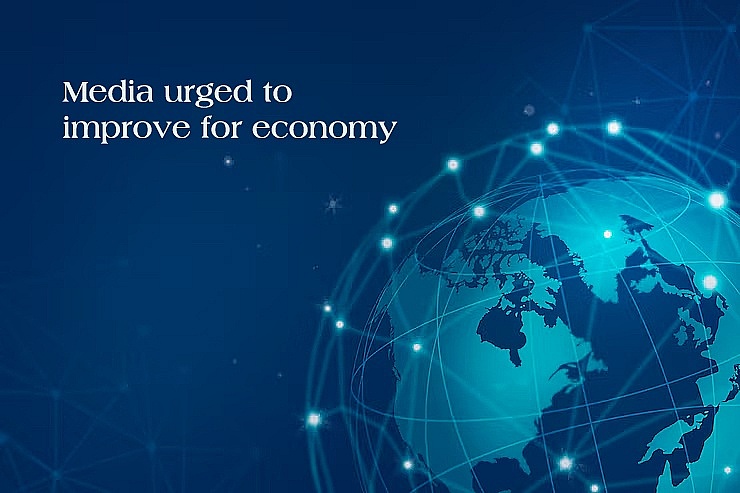 |
| Media urged to improve for economy, illustration photo/ Source: freepik.com |
According to the Law on Telecommunications, for domestic companies that provide basic telecommunication services with infrastructure, foreign ownership is generally capped at 49 per cent; for companies that supply telecommunications services without infrastructure, foreign ownership is capped at 65 per cent.
Vietnam allows foreign ownership of up to 70 per cent for virtual private network services suppliers. Facilities-based operators are required to be state-controlled firms, meaning that the state, through the relevant line ministry, must hold 51 per cent or more of equity.
“Though the revised telecom law was passed by Vietnam’s National Assembly in November 2023 and seems to address some concerns of US companies, there is still uncertainty around the scope of the law,” Lan said.
She said the local economic press has been making contributions to her company’s successful performance since 2010 when it was established.
“Vietnam’s economic newspapers in general are featuring assorted information about the role of the private economic sector in the economy, the country’s policies about business and trade promotion, inflation control, ensuring social security, and reducing poverty. Foreign investors and enterprises are interested in such kinds of information,” Lan added.
Having spent most of his professional life working in the region, economist Raymond Mallon said that it has been encouraging to witness the emergence of an increasingly more professional foreign language press in Vietnam.
Based in Hanoi since 1991, Mallon initially worked as an advisor with the Central Institute for Economic Management and the former State Planning Committee, often in collaboration with the former State Committee for Cooperation and Investment, the Vietnam Chamber of Commerce and Industry, and the former Office of the Council of Ministers.
“A key challenge during this early period was obtaining basic economic information. This was a critical problem, as timely and reliable economic information is essential for effective economic policy research and advice. When VIR was launched, it became easier to access information on the economy, government policy, and business developments and concerns,” Mallon said.
VIR and other publications were also instrumental in initiating informal and structured dialogue between the domestic and foreign business community and the government. “I saw first-hand how useful the information published by the business media was in helping policymakers and advisors to both identify bottlenecks to business development, and to develop recommendations on policy and institutional reforms to ameliorate these bottlenecks,” he said.
Consultations between the Vietnamese government and businesses have since been institutionalised. For example, there are now mandatory requirements for government agencies to consult the business sector when developing and/or amending policies and regulations impacting on businesses.
Mallon also noted that more timely public sector information is helping the business media to play a more effective role.
“For example, the General Statistics Office and other government agencies are increasingly using internet technology to make economic information more accessible to the media and the public. Better information is also helping policymakers and businesses to be more aware of environmental and social costs associated with economic growth,” Mallon said.
A helping hand
According to the Ministry of Information and Communications, by late 2023, Vietnam had six key multimedia agencies, nearly 130 press agencies, over 670 magazine agencies, and 72 television and radio stations.
There are currently about 41,000 people working in the press sector, including16,500 at television and radio stations. Total journalists with press cards for the 2021-2025 period stood at more than 20,500.
However, not many newspapers exclusively feature economic and investment news, such as English-language publications like VIR and Vietnam Economic Times. They have been playing an important role in conveying the Party’s and government’s policies and law, and helping foreign corporations and readers have better information about Vietnam’s economy, allowing them to develop more effective strategies for investing in the country.
Foreign businesses in Vietnam find reliable information to make their decisions in the country, according to Lan.
“For instance, one paper may feature stories about salaries but another may expose how the environment is being polluted and how Vietnam’s labour market is developing. Such information is quite valuable to foreign firms,” she said. “Also, the information is helpful to local authorities in their policymaking. I often see helpful information on VIR and its publications.”
VIR is also a trailblazer in Vietnam in simultaneously operating Vietnamese and English newspapers with relatively high quality under international standards, the Ministry of Foreign Affairs (MoFA) said.
“With its great efforts, VIR has become a reliable source of information for domestic and foreign businesses and investors. It is also one of the press agencies that have been well coordinating with the MoFA in implementing guidelines, policies, and activities in international integration, economic diplomacy, and other diplomatic activities in service of national development,” it said.
Improvements needed
Deputy Minister of Planning and Investment Tran Quoc Phuong said the Ministry of Planning and Investment appreciated the increasing role of the press in the process of socioeconomic development.
“Reporters are getting better at detecting and covering issues, as well as promoting and encouraging good practices, which are the foundation for the government and relevant authorities to contribute to amending laws and regulations to fit with reality,” Phuong said.
Despite some strong intentions, according to many, improvements are necessary for local newspapers to improve their quality and content. Shortcomings are often simply a result of cultural differences in how news articles are structured, crafted over many years.
“I sometimes find that more than a few news items in Vietnamese papers that do not even mention the date of events. No matter how intriguing an article may seem, an undated item will never be carried by the foreign press,” said Nguyen Ngoc Thuyen, a security investor in Hanoi.
“Besides that, the accuracy and believability of economic data is also important. However, the reliability of the economic data of Vietnam’s economic press is often questioned. As the data becomes more reliable, Vietnamese economic news will be assessed accordingly.”
| Ramla Khalidi, resident representative in Vietnam United Nations Development Programme
The partnership between VIR and the United Nations Development Programme (UNDP) has been instrumental in promoting green growth, addressing climate change, and embracing environmental, social, and governance principles in businesses. Recognising that the media can play a significant role in sustainable development, the UNDP has actively provided training for Vietnamese journalists in various domains, including disaster risk reduction and emergency response, gender-sensitive reporting, responsible business, and disability inclusion. The Vietnamese media often share powerful human-interest stories, illustrating the real-time impacts of climate change and the innovative adaptation solutions implemented by local communities. Quality coverage, science-based analysis, and the ability to contextualise issues in both short- and long-term perspectives are essential for fostering a deeper understanding and generating meaningful social dialogues. This is where the UNDP counts on the press to help shape our future steps, as it contributes to narratives on the expectations of communities and societies from decision-makers, and development agencies like the UNDP to drive impactful change. In an era defined by digitalisation and massive social media influence, the future of our children and the next generation of world leaders will be built on the data, information, analysis, and public debates that we create today. The quality and integrity of the information we generate now will serve as a foundation for Vietnam’s decision-makers to build a prosperous and progressive future. |
| Nguyen Trong Nghia, chairman Commission for Communication and Education, Party Central Committee
Vietnamese journalists are proud of the revolutionary journalism founded by President Ho Chi Minh. We are proud of the glorious tradition and worthy contributions of the revolutionary press to the cause of national construction and protection. We also take pride in having many generations of journalists who have used their talent, enthusiasm, creativity, and blood to build, preserve, and develop a revolutionary journalism for the people and the country. Press agencies and journalist associations at all levels must continue to research, creatively apply, and effectively organise all policies and guidelines of the Party, and policies and laws of the state, especially on strengthening the Party’s leadership in activities of the Vietnam Journalists’ Association, on national press development and management, on the strategy of digital transformation of the press, and on regulations for professional ethics and using social networks of Vietnamese journalists. The continuous development of multi-platform journalism, multimedia, data journalism with digital tools such as AI and blockchain technology has created both opportunities and challenges for press agencies and journalists. AI and technology can become virtual assistants for journalism. However, we also face the risk of fake news and misinformation created by AI and other digital tools, and the challenge of having “data capital” illegally used, and press copyrights stolen. Thus, the press needs to unite to find solutions to improve competitiveness, protect copyright, fight against fake news, and repel poor information so that the official press continues to be the most important information provider in the digital space, contributing to building a healthy information society, serving every reader and audience, and also serving the cause of national development. The press needs to transform more strongly and strengthen human resource training in professional expertise, while paying more attention to modern media trends. Articles need to ensure directionality, specificity, attractiveness, and personalisation. Every journalist must study, research, and train themselves to have political courage, cultural foundation, technological skills, and a spirit of dedication and humanity for the benefit of the nation and its people. Each Party member who works as a journalist must first and foremost be exemplary in moral qualities, dedicating intelligence and talent to building the Party, with his or her work having a profound and strong impact on social development processes. Nguyen Huy Dung, deputy Minister of Information and Communications
George Bernard Shaw is quoted as saying that economics is the art of making the most of life. This is also true in the field of journalism, where economics contributes to the healthy development of Vietnam’s revolutionary press. Without effective economic support, it is impossible to have a strong press agency. Whether it is print, radio, or television, the media still relies heavily on advertising revenue. At certain times, revenues from advertising has accounted for over 60 per cent, and for some press agencies it was 90 per cent. However, press agencies are now facing risks of a sharp decline in revenue, in the context that social networking platforms have taken away about 70 per cent of newspapers’ advertising revenue. Media agencies are facing a number of issues in the regulations on financial autonomy mechanisms of public service units. Mechanisms for assigning tasks, placing orders, or bidding for production and provision of public services using the state budget, as well as tax policies for news agencies, should be improved to promote the development of the press economy. Currently, annual regular expenditure on the press is less than 0.5 per cent of the total regular expenditure of the state budget. Spending on press investment is also low, accounting for only about 0.25 per cent of total spending of the state budget. In particular, some major press agencies have little or no support in this area. Charging fees on online newspapers is currently implemented by five press agencies in Vietnam. However, these agencies have only piloted this in a few categories, investing more in quality and content. The content fee model in Vietnam is only at the beginning stage, and has not yet generated significant revenue for press agencies. The Ministry of Information and Communications has made efforts to direct advertising to the press by creating a message that creating clean content will encourage advertising, and advertising will find clean content. The implementation has had results, but it is necessary to promote implementation to get more effectiveness. Meanwhile, some press agencies in Vietnam are carrying out digital transformation into multimedia press units. The strategy for media digital transformation towards 2025 noted that press agencies are to optimise revenue sources, of which 30 per cent of agencies will increase their revenues by at least 20 per cent. This has been a major challenge: nevertheless, we will report to competent authorities in order to craft solutions to promote economic development of the press. Tran Quoc Phuong, deputy Minister of Planning and Investment
Economic journalism plays a key role in the country’s development, and every field of socioeconomic development, reflects and provides all information about economic activities. In particular, for managers, this is an information channel to grasp situations and trends, contributing to promulgating or adjusting economic policies. Economic journalism is also a channel to criticise the economic policies of the State and locality. Among them, VIR is one of the leading business newspapers that is popular with all readers, including management authorities, policymakers, businessmen, consumers, and all people. As a bridge among them, VIR has affirmed its significant role in socioeconomic life by providing information. VIR is a forum for businesses that not only stores information but is also a true scientific library of businesses by gathering all intelligence to serve more businesses. VIR has done a very good job in propagating and disseminating legal policies and updating information in the sector of planning, investment, economics, and statistics, including synthesising and forecasting economic growth and investment. public private investment, foreign direct investment, official development assistance, business support and development, business registration, development of new economic models. The role of the media in economic development in general and businesses in particular is an organic and mutually beneficial relationship; significantly contribute to organising and implementing the Party’s reform policy and the country’s laws and regulations; being a driving force in promoting the development of economic, cultural, social, security and defense fields. The press makes an important contribution to democracy, promoting the role of the people in directly participating in managing socioeconomic development and solving big problems of the country; is a key ‘weapon’ in fighting against corruption, waste, bureaucracy, and social troubles. In the Industry 4.0 era, the press is also a large social school for all people and businessmen, honouring good national and humanistic values, contributing to the development of Vietnamese culture and people On the anniversary of Journalists’ Day, I hope that all journalists to further improve their professional ethics and skills, providing more excellent articles, reflecting more troubles and aspects of socioeconomic life, becoming economic experts. Phung Duc Tien, deputy Minister of Agriculture and Rural Development
In the trend of digital transformation, the press has accompanied and contributed an important role to the overall achievements of the agricultural sector. With the wide coverage and agility in information, the press has conveyed the latest information on science and technology in agriculture, helping farmers keep up with the information of the market. At the same time, with its multidimensional nature, the press promptly verifies complex and unfavourable information sources in agriculture, helping farmers feel secure in production and stabilise the market. The press is also a channel for farmers to express their thoughts and aspirations, effectively connecting the state, manufacturers, businesses, and consumers. From there, it contributes to shaping Vietnam’s agricultural development strategy in the new situation. In upcoming times, press agencies should write more about outstanding models and methods to inspire for farmers and businesses to spread the value of agriculture, for example, the articles and stories about switching from agricultural production thinking to agricultural economic thinking or production models moving from single-value growth to multi-value growth. In addition, because the press has the role of shaping public opinion, it is also necessary to consider how to use words to avoid causing the phenomenon of reflecting the problem seriously. When reflecting on the problem, it is necessary to carefully understand the nature. For example, when we succeed in exporting a type of agricultural product with high value, but some time later there are articles about the price drop of that product, confusing farmers and consumers. Green-skin grapefruit is an example. I read an article reflecting on the fact that many households growing green-skin grapefruit in Soc Trang province are falling into more difficulties because the selling prices of this fruit are dropping sharply, and this product has never had a low price like this. However, the essence of the story here is that when people saw the economic efficiency of green-skinned grapefruit, they planted it on a massive scale without planning, without a methodical manner, and without ensuring quality for export. As a result, those grapefruits cannot be consumed and the price is much lower than that of exported fruit. In these cases, press agencies should reflect the essence of the problem instead of using sensational words. |
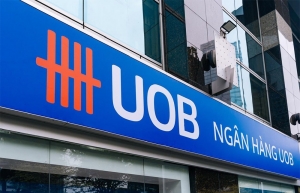 | Steady ship anticipated for monetary policy to 2025 Despite an uncertain global economic environment, Vietnam’s overall macroeconomic situation is forecast to remain stable in the second half of 2024. Suan Teck Kin, head of research at UOB, shared with VIR’s Thuy Van the outlook of Vietnam’s economy and how the country positions itself to capitalise on opportunities for economic growth and investment. |
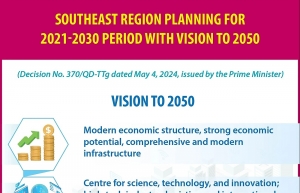 | Southeast Region Planning with vision to 2050 Under Decision No. 370/QD-TTg issued by the Prime Minister on May 4, 2024, the Southeast Region will be developed in to a civilized, modern, and dynamic area, becoming a hub not only in Vietnam but also in Southeast Asia in terms of economy, finance, education, training, science, technology, innovation, and digital transformation. |
 | Vietnamese economy fared well in Q1 despite external risks The global economy is facing several headwinds, including the slowdown in China and the Eurozone as well as the US Fed's possible delay of interest rate cuts. In this context, ASEAN may be a global safe haven for economic growth. Abel Lim, head of Wealth Management Advisory and Strategy at UOB, discussed with VIR's Thanh Van the outlook of the global economic condition and its impact on Vietnam. |
What the stars mean:
★ Poor ★ ★ Promising ★★★ Good ★★★★ Very good ★★★★★ Exceptional
Related Contents
Latest News
More News
- Ho Chi Minh City launches plan for innovation and digital transformation (February 25, 2026 | 09:00)
- Vietnam sets ambitious dairy growth targets (February 24, 2026 | 18:00)
- Masan Consumer names new deputy CEO to drive foods and beverages growth (February 23, 2026 | 20:52)
- Myriad risks ahead, but ones Vietnam can confront (February 20, 2026 | 15:02)
- Vietnam making the leap into AI and semiconductors (February 20, 2026 | 09:37)
- Funding must be activated for semiconductor success (February 20, 2026 | 09:20)
- Resilience as new benchmark for smarter infrastructure (February 19, 2026 | 20:35)
- A golden time to shine within ASEAN (February 19, 2026 | 20:22)
- Vietnam’s pivotal year for advancing sustainability (February 19, 2026 | 08:44)
- Strengthening the core role of industry and trade (February 19, 2026 | 08:35)

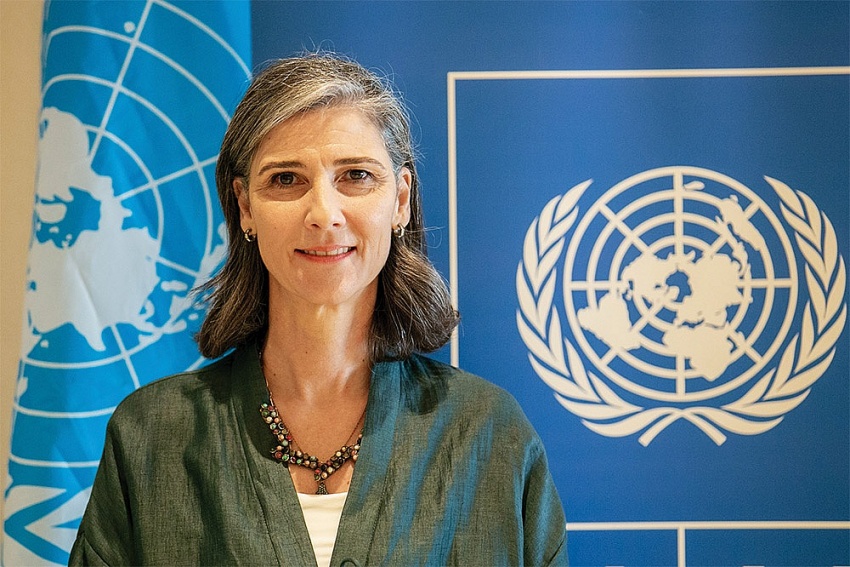
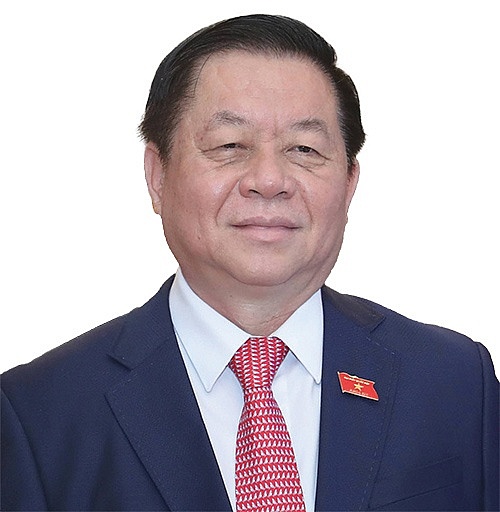
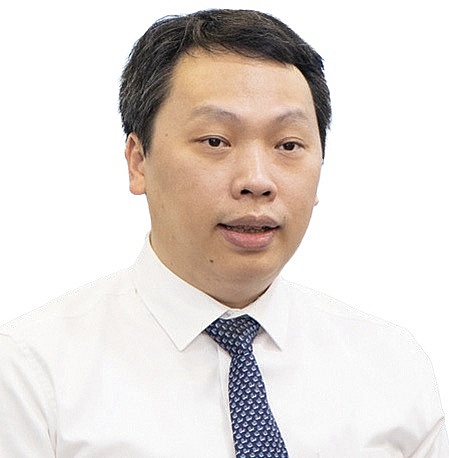

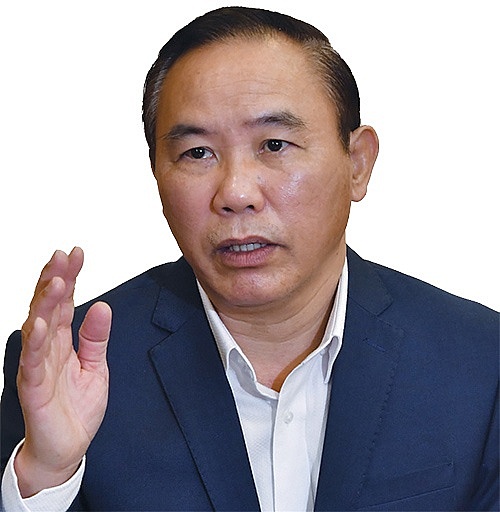
 Tag:
Tag:


















 Mobile Version
Mobile Version